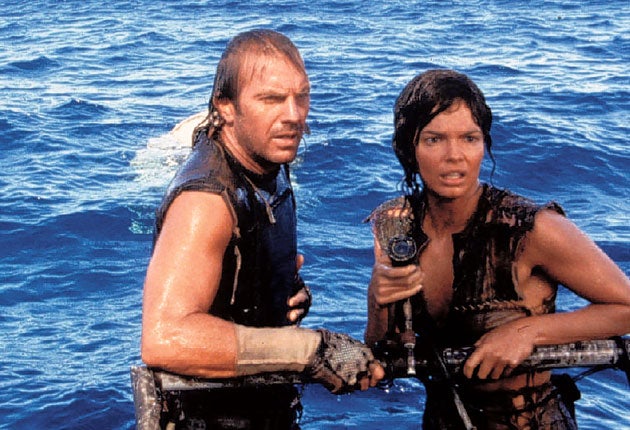Desperate times call for desperate measures. So with hundreds of thousands of gallons of oil still spewing into the Gulf of Mexico each day, and its corporate image starting to resemble the tar-covered sea creatures now washing on to Louisiana's fragile shoreline, BP has called on Kevin Costner to help stave off environmental Armageddon.
The Hollywood star has been bobbing around the Mississippi Delta helping representatives of the British oil firm and US coastguard test-drive a stainless steel device called the Ocean Therapy. In a claim which sounds as unlikely as the plot premise of Waterworld, he says it can quickly and efficiently clean oil from tainted sea water.
Bizarrely, Costner may be on to something. The actor has spent 15 years and roughly $26m (£18m) of his personal fortune developing the patented machine with the help of his elder brother Dan, a scientist. It works like a giant vacuum cleaner, sucking up dirty liquid and then using a high-speed centrifuge to separate it into oil, and heavier water.
When he allowed the local media to see Ocean Therapy in action – albeit on dry land – it appeared to work as advertised. Yesterday, six of the devices were attached to boats and floated into the Gulf, so the organisers of the clean-up operation could see whether they might also be capable of functioning on the high seas.
"This is a technology that we know works, and has worked for a long time," Costner said, adding that 26 of the machines are now in Louisiana ready to be put into action. "I'm just really happy that the light of day has come to this, and I'm very sad about why it is. But this is why it was developed, and like anything that we all face, as a group, we face it together."
Costner, 55, has quietly been developing Ocean Therapy since the mid-1990s when he founded the Costner Industries Nevada Corporation, a company which funded eco-friendly research by his brother and a team of scientists. Aside from the water cleaning device, the firm has also invented a non-chemical battery.
Each of the 26 Heath Robinson-style machines now in Louisiana waiting to be deployed can clean between 5 and 200 gallons of water a minute, depending on its size, said Costner's lawyer and business partner, John Houghtaling, which means they could in theory mop up oil at the rate it is currently gushing into the Gulf. Polluted sea water which passes through them comes out 97 per cent clean.
"Kevin saw the Exxon Valdez spill, and as a fisherman and an environmentalist, it just stuck in his craw, the fact that we didn't have separation technology," said Houghtaling. "Kevin wrote all the checks for this project. This was one man's vision. Sometimes it takes a star to come in with their money and time to make a difference."
BP was cautiously optimistic about the machines, saying they could provide a valuable tool in the armoury of clean-up workers, provided they "meet regulations with regard to discharge". The firm could certainly use some good news: a warm ocean current is now transporting the slick from the ruined Deepwater Horizon rig towards the coast of Florida. Roughly six million gallons of oil have already washed into the Gulf, and is starting to hit the fragile coastal swamps of Louisiana, which are home to an array of rare birds and mammals.
In Washington, BP is being accused of underestimating the scale of the leak in an effort to protect its reputation. The firm originally said that 1,000 barrels of oil were spilling each day, but later increased that figure to 5,000. Many scientists believe the real figure is higher still.
Amid growing political pressure, BP has agreed to allow live underwater footage of oil billowing into the ocean to be screened online. Although one relief well was drilled last week, and is said to be capturing 200,000 gallons of oil a day, the firm now admits that it could take until August to plug the leak.
Costner isn't the only Hollywood star taking an interest in the disaster. The Avatar director James Cameron has offered to make his collection of submarines available to clean-up teams, while Robert Redford is starring in a TV ad sponsored by the Natural Resources Defence Council, which uses the spill to call for the US government to promote clean energy.
Celebrity inventors
Hedy Lamarr
In 1940, the glamorous film star Hedy Lamarr, whose biggest success was in Cecil B DeMille's 'Samson and Delilah', was responsible for patenting a communications system for use in weaponry against Nazi Germany. The patent application lodged in 1941 said the invention was "especially useful in the remote control of dirigible craft, such as torpedoes" since the "frequency-hopping" system prevented the signal from being blocked. The frequency hopping system is now routinely used in devices such as mobile phones. But Ms Lamarr, who died in 2000, did not benefit from the modern use of her invention since the patent had long since run out.
Jamie Lee Curtis
The Hollywood star had a successful year in 1988. She won acclaim for her performance in 'A Fish Called Wanda', and patented her design for a new nappy (with added disposable wipe). It looked like a normal nappy but with a pocket on the outside. She suggested in her patent that the bringing together of the two would lead to "a significant advance in the simplification of infant care".
Dame Barbara Cartland
In addition to churning out hundreds of romantic novels, Dame Barbara Cartland was honoured for her role in the development of the aviation industry. She was interested in the early gliding movement. Working with two RAF officers, Dame Barbara devised the first aeroplane-towed glider for long distances. The concept developed into troop-carrying gliders used by the military. In 1984, she received the Bishop Wright Air Industry Award.

Join our commenting forum
Join thought-provoking conversations, follow other Independent readers and see their replies
Comments